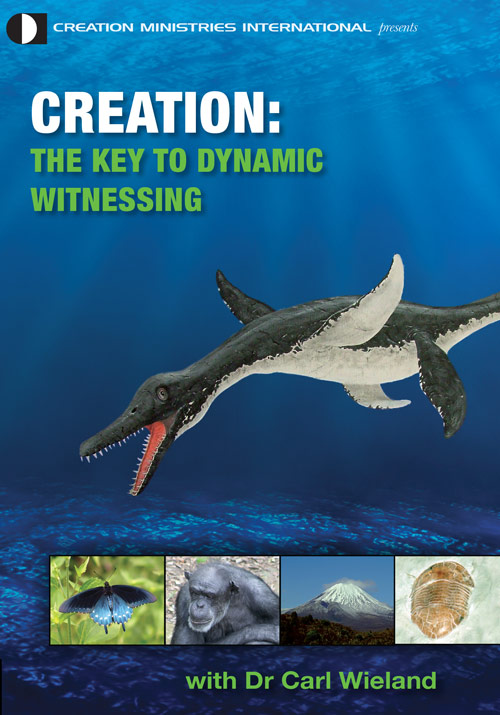Answering fools’ folly

For many Christians today, it might seem that the Bible uses quite harsh language to describe certain of their friends and loved ones—those who don’t believe in God. It calls them ‘fools’:
“The fool says in his heart, ‘There is no God.’”—Psalm 14:1 (also Psalm 53:1)
Similarly in Romans 1:18–32, people who deny God as Creator—despite ubiquitous evidence of His handiwork1—no matter how ‘wise’ they (or others) might think they are, actually thereby “become fools”, and their “foolish hearts” are darkened.
But this doesn’t mean we are to love them any less. On the contrary, we are to “have mercy on those who doubt; save others by snatching them out of the fire” (Jude 22–23a). We are to “be ready always to give an answer” to those who question us about our faith, and to do this with “gentleness and respect” (1 Peter 3:15).
Now, I confess that for my first 12 years as a Christian (i.e. since I abandoned atheism and professed in my mid-20s that I would henceforth follow Jesus), I don’t think I ever “gave an answer” to anyone—even when I was ridiculed by certain of my atheist friends for ‘having become religious’.
But all that changed after I attended a creation seminar in 1997.2 Suddenly I could see that the Bible provides believers with a powerful explanatory framework to enable them to give an answer to the questions and challenges from atheists and other non-Christians.
Instead of my self-consciously cringing internally whenever someone asked about my faith, my one-on-one conversations with non-believers became fun and exciting—not least because of the potential eternal benefits for them! I’d like to recount here one such conversation, not just because it was tremendously encouraging and memorable for me, but also because in hindsight I can see I unwittingly brought into play a number of scriptural injunctions relating to evangelism, including ones that atheists wrongly say are contradictory: Proverbs 26:4 and 5.
The conversation extended unbroken for more than three hours during a commercial airline flight from the northern Australian city of Darwin to Brisbane on the east coast.
From Darwin to … Christ?

The young lady seated next to me, with classic Northern Territorian forwardness, introduced herself. Rebecca3 was aged about 15 years and was clearly extremely intelligent, having placed highly in national science competitions. So it wasn’t long before we were discussing ‘science and religion’ issues. She was upfront about her atheist views, believing evolution, and was aghast to learn of my conversion from atheism to biblical Christianity (6,000-year-old universe and all that) ‘despite’ my having a Ph.D. (Yet another demonstration that the mere existence of Bible-believing Ph.D. scientists4 is confronting to atheists!)
During our wide-ranging discussion, Rebecca spoke of her desire to study veterinary science, so as to be equipped to fulfill her Jane-Goodall-like passion5 for nursing endangered primate species such as the gorilla and gibbon back to health.
I said, “Wait a minute. In an evolutionary survival-of-the-fittest world they’re our competitors! Why should we squander resources on looking after animals of no use to us and which cannot possibly compete with man, and are going to die anyway? Not only does it make no sense, but you’re a traitor to your own species!”
Rebecca paled, and leaning back dejectedly, said, “When I boarded this flight, I knew who I was, I knew exactly what to think, but now … I’m not so sure any more about what to believe—and on top of that, you’ve now taken away my reason for living …”
I replied, “Whoa right there! Time out! What I just put to you was according to your view of origins, not mine. I believe the Bible’s account of origins. Your desire to care for sick animals is completely illogical within an evolutionary framework, but is absolutely consistent with what the Bible says—that God has given man dominion over the creation [Genesis 1:28]. So it makes complete sense that God would put into your heart a passion for looking after His sick and hurting creatures in this cursed and fallen world.”
Clearly that hit home, for Rebecca then said, “I want to hear more.”

And so our conversation continued. I ‘gave an answer’ to her increasingly intense questions about life, the universe and everything.
At the end of the flight, as the plane taxied to a halt, I said as nonchalantly as I could, “Well, I don’t suppose you’ve converted to Christianity yet?”
Rebecca looked straight back at me, and answered softly, yet firmly, “I am very, very close.”
As you might imagine, Rebecca’s closing comment and her undertaking (insistence!) that she would buy her own Bible to read it for herself, left me invigorated.
After disembarking, as I mentally replayed our conversation, I became aware that I had unwittingly applied the advice of both Proverbs 26:4 and 26:5:
“Answer not a fool according to his folly, lest you be like him yourself.”—Proverbs 26:4
“Answer a fool according to his folly, lest he be wise in his own eyes.”—Proverbs 26:5
Some skeptics like to mock these verses as being ‘contradictory’, as if the author was stupid enough to put genuinely contradictory sentences together, although it was obviously intentional.6
When telling Rebecca she was a ‘traitor’ to her own species, it was right in line with verse 5—I had seized an opportunity (Colossians 4:5–6) to expose the folly of the evolutionary paradigm. And once Rebecca had got that point (“you’ve now taken away my reason for living”), my hasty correction and supplanting of that folly with the wisdom that comes from God’s Word was right in line with verse 4.
And look at the result—an avowed atheist evolutionist at the start of the flight had dramatically shifted ground during the course of a single conversation. She had gone from shock at my believing the Bible, to saying “I want to hear more”—a nice example of what can be achieved by adopting the Apostle Paul’s strategy when addressing Greek-thinkers of going back to origins. “We want to hear you again on this subject”—Acts 17:16–34.7
Notice the importance of applying both verse 4 and verse 5. It would not have been enough if I had merely made my ‘traitor’ remark. That would have limited me to arguing without the Bible—in which case I would have sadly been just like the one I was arguing with! Unfortunately, many Christians erroneously think they can argue against evolution (or other issues like gay ‘marriage’ or abortion) using only the evolutionists’ own presuppositions. In other words, tacitly agreeing to the evolutionists’ terms of the debate: “Keep the Bible out of it!”
No, instead we have to show others that logical thinking is only possible when built on the Bible.8 So when it comes to applying these two verses from Proverbs 26, it’s a case of both/and, not either/or. They are not contradictory instructions, but complementary.
Scripture—a great guide to evangelism!

In talking one-on-one with Rebecca, I had opportunity to speak to her personal hopes and ambitions, knowing that God cares about these (Psalm 37:4, 1 Peter 5:7). Her desire to nurse sick animals was a good thing, which had come from God (1 Timothy 4:4), written on her heart (Romans 2:15). But as long as she entertained evolutionary ideas of origins, her thinking would be illogically “divided against itself” (Matthew 12:25), “unable to stand”, i.e. unsustainable. I invited her to choose instead to “cling to the good” (Romans 12:9).
Was I disappointed she hadn’t yet gone as far as receiving Christ? Well … that would’ve been great, but the Scriptures remind us that none of us works alone (1 Corinthians 3:6), and that prayer is crucial (Acts 26:29, Romans 10:1). We can have the satisfaction of knowing that God is sovereign in salvation (John 6:44), and our labours in these matters are not in vain (1 Corinthians 15:58).
Certainly I had the satisfaction of seeing with my own eyes someone who, in boarding that plane to Brisbane, left Darwin behind—not just the city, but hopefully also the ideas of the man after whom it was named.9 I pray that many others, too, will leave evolutionary ideas behind and instead embrace Jesus Christ, who is the Way, the Truth and the Life (John 14:6).
References and notes
- See Sarfati, J., Is the design explanation legitimate? (chapter 9 in Refuting Evolution, available via creation.com/store), creation.com/design-legit. Return to text.
- The presenters were CMI–Australia’s Dr Carl Wieland and Dr Don Batten, who have since become my colleagues (quite a story in itself). Return to text.
- Not her real name. Return to text.
- See Creation scientists and other specialists of interest . Return to text.
- Considered the world’s foremost expert on chimpanzees, Jane Goodall is renowned for her 45-year study of chimps in the wild in Tanzania, and for her advocacy of animal conservation and protection. Return to text.
- The skeptics are also logic-challenged. A contradiction is A and not-A. These two pieces of advice are logically a dilemma, not a contradiction—each alternative has its own advantages and disadvantages. Return to text.
- For more on this see the DVD presentation Creation Evangelism, available via creation.com/store. Return to text.
- See also Loving God with all your mind: logic and creation. Return to text.
- On 9 September 1839, HMS Beagle sailed into Darwin harbour during its surveying of the area. The Beagle’s captain, John Clements Wickham (promoted into the position after the retirement of Captain Fitzroy), named the region ‘Port Darwin’ in honour of his former shipmate Charles Darwin (who had left the ship in October 1836). The settlement there became the town of Palmerston in 1869, and was renamed Darwin in 1911. Return to text.





Readers’ comments
Comments are automatically closed 14 days after publication.